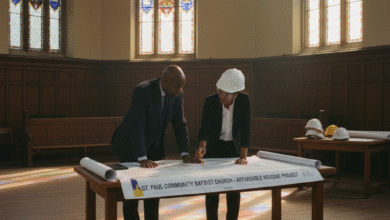

The current housing market represents a formidable challenge, a modern manifestation of a long and painful history of economic exclusion. The dominance of cash-rich buyers threatens to lock another generation of Black New Jerseyans out of homeownership, the primary vehicle for building wealth in America. The stakes could not be higher. Yet, this moment of crisis is also a moment of clarity and a call to action. Overcoming these immense structural barriers requires a two-pronged approach: one of immediate, strategic individual preparation, and one of long-term, collective struggle for systemic change. This is the playbook for that fight.
Part I: Your Short-Term Playbook – How to Compete Now
Navigating this hostile market requires acknowledging the immense challenge and leveraging every available advantage. The following strategies are not a panacea for systemic inequality, but a practical guide for maximizing one’s position in an unfair fight.
Financial Fortification
Before entering the market, the foundational work must be done.
- Credit as a Cornerstone: A strong credit history is non-negotiable for securing the best possible mortgage terms. Aspiring homeowners must actively work to build and maintain their credit. Free, expert-led resources are available to help. The Urban League of Essex County, for example, offers virtual “Credit Building Basics” workshops that cover how to build credit, fix errors, and understand its importance. Other non-profit organizations like Navicore Solutions and New Jersey Citizen Action provide professional, HUD-approved credit and housing counseling.
- Aggressive Saving & Debt Management: Saving for a down payment and closing costs is a monumental task, particularly for Black buyers, who report high levels of student loan debt. A disciplined approach to budgeting and debt reduction is the essential first step toward financial readiness.
Unlocking Your Secret Weapon: State Assistance
This is the most critical component of a short-term strategy. New Jersey offers powerful programs specifically designed to level the playing field for first-time and first-generation buyers.
- NJHMFA Down Payment Assistance Program (DPA): This statewide program provides qualified first-time homebuyers with up to $15,000 (the amount depends on the county) to be used for down payment and closing costs. The assistance comes in the form of an interest-free, five-year forgivable second loan with no monthly payment. To qualify, a buyer must not have owned a home in the previous three years and must pair the assistance with an NJHMFA first mortgage.
- NJHMFA First Generation Down Payment Assistance Program: This vital program is a direct response to the challenge of intergenerational wealth disparity. It provides an additional $7,000 for homebuyers who are the first in their family to own a home. This includes individuals whose parents do not own property or those who have been in New Jersey’s foster care system. When combined with the standard DPA, this can provide up to $22,000 in assistance in higher-cost counties. The program has proven remarkably effective at reaching communities of color, with Black homebuyers making up 34.4% of participants and Latino homebuyers 31.2%.
The Alternative Path: The NACA Mortgage
For those shut out of traditional lending, the Neighborhood Assistance Corporation of America (NACA) offers what it calls the “Best in America Mortgage.” This is a truly transformative product.
- Program Features: NACA’s program features no down payment, no closing costs, no fees, and no private mortgage insurance (PMI), with a below-market fixed interest rate.
- Key Advantage: Crucially, NACA does not consider a borrower’s credit score. Instead, it focuses on their recent history of making on-time payments, such as rent. This approach opens the door to homeownership for many who would otherwise be denied. The process begins by attending a free NACA Homebuyer Workshop to become “NACA Qualified”.
Your New Jersey Homeownership Toolkit
Assembling the right team is essential. This includes working with a HUD-approved housing counselor from an organization like the Urban League or New Jersey Citizen Action, and finding a real estate agent who is an expert in the assistance programs listed below.
| Organization/Program Name | Service Provided | Who It’s For | Website/Contact |
| NJHMFA DPA Program | Up to $15,000 in down payment/closing cost aid | Qualified first-time homebuyers in NJ | nj.gov/dca/hmfa |
| NJHMFA First-Gen Program | Additional $7,000 in assistance | Qualified first-time homebuyers who are also first-generation | nj.gov/dca/hmfa |
| NACA | No down payment, no closing cost mortgage; no credit score consideration | Low- to moderate-income homebuyers | naca.com |
| Urban League of Essex County | Housing counseling, credit-building workshops | Aspiring homeowners in Essex County | ulec.org |
| New Jersey Citizen Action | Financial coaching, first-time homebuyer counseling | NJ residents seeking financial guidance | njcitizenaction.org |
Part II: The Long-Term Strategy – Reclaiming Our Future
While individual preparation is necessary, it is not sufficient to overcome a crisis rooted in systemic failures. The long-term fight must be a collective one, aimed at changing the fundamental rules of the game.
Changing the Rules of the Game: Policy & Advocacy
- Strengthening the Mount Laurel Doctrine: The Mount Laurel Doctrine is New Jersey’s constitutional mandate that every town provide its “fair share” of affordable housing. Recently signed legislation (A4/S50) strengthens this framework by streamlining the development process. Continued advocacy for its robust enforcement is paramount.
- Zoning and Land Use Reform: Much of New Jersey is locked into exclusionary “single-family-only” zoning, which artificially limits housing supply and drives up costs. Advocates are pushing for reforms to allow for “gentle density,” such as duplexes and townhouses, which can increase the supply of more affordable housing types.
- Combating Appraisal Bias: A home’s value is the bedrock of its wealth-building power. A new state law explicitly prohibits racial discrimination in home appraisals, a critical step toward ensuring Black homeowners can realize the full value of their investment.
Building Wealth Collectively: Innovative Ownership Models
- Community Land Trusts (CLTs): The CLT model offers a powerful alternative to the speculative housing market. In a CLT, a non-profit, community-based corporation owns the land in perpetuity. Families then purchase the homes on that land, entering into a long-term ground lease. This model creates permanently affordable housing, prevents displacement, and builds community-controlled assets. The emerging Jersey Community Land Trust is an example of this model taking root in the state.
A comprehensive, long-term strategy must operate on multiple fronts simultaneously. This “three-legged stool” approach—addressing upfront access (with programs like DPA), housing supply (through zoning reform and Mount Laurel), and long-term affordability (with models like CLTs)—is essential. Advocating for only one leg of the stool will cause the entire structure to fail; true change requires an integrated strategy.
The Power of the Collective: Organizations on the Front Lines
This fight is being led by a coalition of dedicated organizations working to reshape New Jersey’s housing landscape.
- Fair Share Housing Center: Uses legal action and policy advocacy to enforce the Mount Laurel Doctrine and has helped create over 21,000 affordable homes since 2015.
- New Jersey Institute for Social Justice (NJISJ): Produces the critical research that quantifies the state’s racial wealth gap, providing the data that fuels the movement for change.
- Housing and Community Development Network of NJ (HCDNNJ): Supports a statewide network of community developers and has launched the “Jumpstart Program” to train and empower BIPOC (Black, Indigenous, and People of Color) developers, ensuring that the new supply of affordable homes is built by and for the community.
The progress made in New Jersey was not given; it was won through decades of relentless, community-rooted advocacy. This history demonstrates that the ultimate long-term strategy is the building of collective political power. It means supporting these frontline organizations, showing up at local zoning board meetings, and electing leaders who are true champions of housing equity. Building community power is just as important as building houses. The goal is not simply to buy a house, but to forge a new legacy of economic opportunity and a permanent place to call home for Black communities in the Garden State.






One Comment